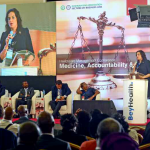AR: Clare, it has been an absolute honour to have you at the Medicine, Accountability and Law conference this year. You mentioned several key points during your talk that I would like to explore further with you. First on my mind is your work with the Healthcare Federation. Tell us a bit about this.
CO: The Healthcare Federation of Nigeria,otherwise known as HFN, was set up about four years ago as it became apparent that healthcare delivery in Nigeria was becoming extremely fragmented. It was becoming
increasingly difficult for healthcare provider bodies in the private sector to come together to speak with one voice about a range of subjects of relevance to their shared interest in the healthcare industry.
So, we have assumed the position of a single umbrella body that represents the interests of an entire spectrum of providers involved with private sector healthcare – from physiotherapists, doctors and nurses to captains of industry in the pharmaceutical area and even including practitioners who teach in ivate universities – the full range of healthcare services, the entire value chain.
Out of pure necessity, we represent the voice of private sector participation, majorly because we needed an advocacy body to speak with the government on a range of cross-cutting and critical issues such as healthcare financing, human resources for healthcare capacity development and so forth.
But our most significant thrust over the last few years has been a focus on a great deal of advocacy directed towards government – indeed, how do we partner with government recognising that government cannot do it alone? We, the private sector, provide 60 to 65 per cent of the healthcare in this country and we need to be collaborative and articulate in the way we speak with the government with one voice at the same table to provide access to quality healthcare on behalf of Nigerian patients.
AR: Yes, that is so important. As a lecturer,I am very often inundated with enquiries from students who are eager to do much more.How does one get involved with the Healthcare Federation?
CO: The Healthcare Federation offers three distinct types of membership. We have the corporate membership which allows the opportunity for corporate businesses to become members by paying a fee. There is an individual membership which applies to people who wish to support the HFN effort in their capacity as private citizens. Association membership serves to bring trade bodies and professional organisations that cater to multiple
partners into the discussion.
…And then we have the volunteers.Strictly speaking, the Healthcare Federation is a tremendous volunteer effort. The volunteers are incredible! They give their time, talent and very often their treasure – of immense value to us as an organisation. Lobbying is not easy… it is extremely difficult indeed, but it is equally
satisfying to see the results. We are presently involved in lobbying government on a couple of policies to help unlock the potential of the private sector.
The private sector provides 60 to 65 percent of the healthcare in Nigeria
The first one is on incentivising healthcare investment in Nigeria. We were able to pass it through the National Council on Health last year and are now hoping for it to go through the Federal Executive Council prior to it being
handed over to the NIPC (National Investment Promotion Council).
The purpose is to help lower the barriers to entry on behalf of businesses participating in the healthcare sector, through practical measures such as tax rate incentives, duty waivers and access to land – you know, those
things that currently make it hard to do health care business in Nigeria. If we are able to lower these barriers to entry, then it’s a win-win situation for everyone – it means we provide scale, encourage competition and benefit the healthcare consumer and the economy all at once. It’s a hugely collaborative approach.

We are also working on the new policy on public-private partnership because in the past,…as you are aware the system was not originally intended for healthcare, it has been used majorly for building bridges and airports.
However, this is an extremely important instrument, but one which must be made fitfor-purpose.
AR: You talked a lot about strategic purchasing in your session. I was intrigued by this. So, how
does this all fit with the question of strategic purchasing?
CO: We were talking majorly at this conference today about financing. One of the challenges confronting healthcare financing in developing economies such as Nigeria is the healthcare industry’s dependence on budgetary allocation from the government, which is approximately 4 percent of the total healthcare spend and even
this seems to be dwindling year on year – we’ve had 4.2 percent, 4.1 percent and now 3.9 percent this year! It is obvious that the government cannot do it alone, so it is essential that we find innovative ways of providing and
funding health care. As I said in my talk, we need to be able to provide funding to support the demand and the supply side of the equation.
So, when it comes to the crunch, what is it that we can do to bridge that divide. Insurance is a big issue. How do we make healthcare insurance mandatory so that every Nigerian has access to basic care? If we can get primary care right, we can then concentrate a little more on secondary and tertiary care.
Let’s pay for outcomes and have an innovative way of providing these services
However, the funding challenge ought to be handled as a single problem, so primary healthcare needs are not addressed to the detriment of tertiary care funding requirements. We need to fashion a solution that takes all
aspects of the problem into consideration.
Now on to tertiary care. The cost of tertiary care is phenomenal, so we want to push the administration of basic healthcare provision funds through the National Health Act. We,therefore, need the National Health Act implemented in a way that gives the National Health Insurance Scheme additional capital and access to funding for routine requirements and the care of poorer patients.
How do you, in the present circumstances, provide access to care for the poor and needy in potentially catastrophic situations? We decided on the need to set up a separate “catastrophe fund”, dedicated to indigent patients unable to afford the cost of life-threatening non-communicable diseases such as cancer, heart disease, open heart surgery, interventional cardiology, kidney transplants and so on – but the biggest of these
considerations was cancer.
put our heads together at that stage, and thought “…maybe we could pay for a package of care – let’s pay for outcomes and have an innovative way of providing these services,rather than spending money on governmentinitiated
capital expenditure all the time.”

It occurred to us that we could put a fund together and encourage private investment in the sector! An initiative like this (with welldefined outcomes) is likely to spur publicprivate partnerships into action by galvanising support from corporate organisations to provide much-needed infrastructure for public sector healthcare.
I don’t know if you are aware of this, but the National Hospital in Abuja over the last three to four months has had a brand new Linear Accelerator set up there. The hospital is providing cancer radiation treatment to well
over 40 patients a day. They have a waiting list of over six months and are just about to acquire a brand-new LINAC to help cope with this backlog the next three weeks.
Through a similar partnership discussion,Shell Petroleum Development Company was able to fund the purchase of a linear accelerator. Now let us consider the antecedents of the problem. Over the last 15 years, we have had almost no private investment in the space. We have endured dilapidated and obsolete technology …and you know, sweat the asset for whatever we can extract. Now all of a sudden within three months, we have three new LINACs – I understand another one is soon to be commissioned in Calabar!
AR: Because you are now purchasing the outcome rather than the …
CO: Yes! People are thinking about outcomes,thinking about what they can do to help the indigent patient. So, there is a lot of innovation coming into health care financing and plenty to be said for advocacy in this area. We are very excited, and there’s more to come.
AR:>/span> Watch this space! Thank you very much,Mrs Clare Omatseye. It has been a most stimulating and insightful conversation.I am encouraging everyone to visit your organisation’s website – www.hfnnigeria.com
and to get involved as members, corporate partners and volunteers. The key phrase that I am taking away from this discussion is “strategic purchasing”. Thank you once again for your time today.
Disclosure forms provided by the author are available at NEJM.org.
Editor’s note:
Author Affiliations
Supplementary Material
| Disclosure Forms | 83KB |
Add your Comment
Add your Comment
Leave a Reply
You must be logged in to post a comment.
BHQJ 2018 ; 001:34-36
Related Article 
Medical Negligence & the Law5th May 2018 . Atrogenic harm is a matter of significant concern in Nigeria admin
Colorectal Cancer Overview5th May 2018 . [dkpdf-columns columns="3" equal-columns="false" gap="10"] Introduction Colorectal cancer is a major admin
Funding Healthcare Services in Nigeria – A conundrum of demand, policy and supply!5th May 2018 . [dkpdf-columns columns="3" equal-columns="false" gap="10"] Doctor, I happy say na you admin
5 “Provocations” of Healthcare Quality Reform6th May 2018 . [dkpdf-columns columns="3" equal-columns="false" gap="10"] n the four decades since he admin
Health Insurance, Activism & Urgent Change6th May 2018 . [dkpdf-columns columns="3" equal-columns="false" gap="10"] AR: Dr Soyinka, it’s wonderful to admin
Anne Olowu talks about her “Masterclass” experience6th May 2018 . [dkpdf-columns columns="3" equal-columns="false" gap="10"] As I suspect is the case admin
Stomach & Oesophageal Cancer in Nigeria6th May 2018 . [dkpdf-columns columns="3" equal-columns="false" gap="10"] Gastric and Oesophageal (Upper GI) cancers admin
Setting out the Stall!7th May 2018 . [dkpdf-columns columns="3" equal-columns="false" gap="10"] "The drawbacks of our false knowledge admin





Leave a Reply
You must be logged in to post a comment.